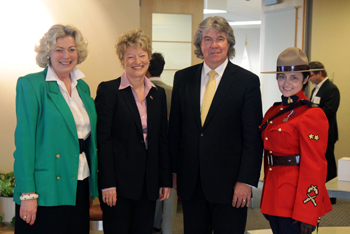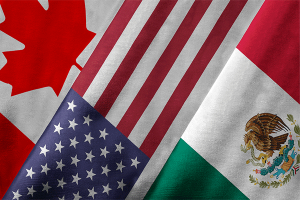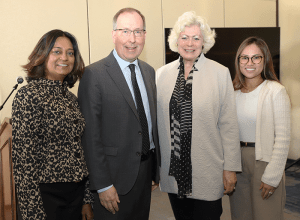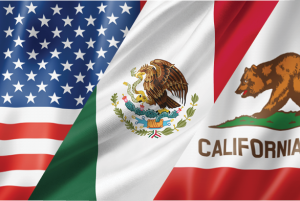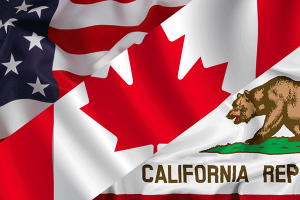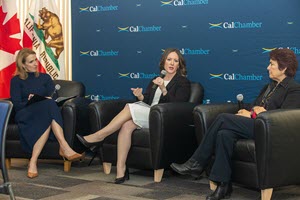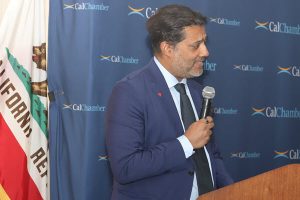Trading Partner Portal: Canada
Overview
CalChamber Submits Comments on Review
of US-Mexico-Canada Agreement
CalChamber, November 4, 2025
Governor Newsom and Visit California launch international tourism campaign welcoming Canadians to experience the warmth and love of the Golden State
Governor of California, April 14, 2025
Guest Commentary: The True Cost of U.S. Tariffs on Canada
Rana Sarkar, Consul General of Canada in Northern California, February 25, 2025
Trump Tariffs: Some Put on Hold, Others Take Effect
CalChamber, February 4, 2025
List of products from the United States subject to 25 per cent tariffs effective February 4, 2025
Department of Finance, Canada
Trump Tariff Plans Cause Concern, Much Speculation
CalChamber, January 31, 2025
Guest Commentary: Securing
North American Prosperity
CalChamber, April 16, 2024
Partners in Prosperity: Exploring the Significance of Canada – U.S. Trade
Canadian Chamber of Commerce, October 2024
Trade Overview

Canada is the second largest country in the world in land mass after Russia, accounting for around two-fifths of North America. As well as the mainland, it holds thousands of nearby islands such as the Arctic Archipelago and Newfoundland. Canada has a southern border with the United States, a western border with Alaska, and has Greenland in its eastern region. It holds coasts with the Pacific, Arctic, and Atlantic Oceans, and contains mountainous regions, plains, basins, and forests. The climate of Canada is known for its long winters and short summers, but it also holds a variety of climates depending on the region one is in. Britannica
While large in land mass, it is also one of the most sparsely populated countries in the world. Canada is known for its diverse population, with total population as of 2025 being 41.6 million people (Statistics Canada). Its nominal GDP came in at $2.2 trillion, and GDP per capita at $53,835. It has been rated the tenth largest economy in the world and also sees some of the highest incomes per capita in the world. Key industries such as services, natural gas, and manufacturing continue to be a large contributor to the economy, with its service industry being the most dominant. U.S. Department of Commerce
Canada is a constitutional monarchy with a highly complex market economy, ranking 30 in complexity from the Economic Complexity Index, and ranked nineteenth in most talent competitive countries for its ability to nurture and find talent in its workforce (IMD World Competitiveness Center). It has growing sectors in technology, aerospace, and renewable energy, as well as having the second-largest automotive industry in North America, which is closely integrated under the USMCA with the U.S. and Mexico. Its technological sectors are notable as they are highly trade dependent and expected to grow through 2025. The of Observatory of Economic Complexity, U.S. Department of Commerce
U.S. – Canada Trade
The United States and Canada enjoy one of the largest bilateral trade and investment relationship in the world, with Canada being number one in U.S. export markets and second in two-way trade. In 2024, two-way trade in goods between Canada and the United States was $761.2 billion. When subtracting goods exports from goods imports, the U.S. currently holds a goods trade deficit of -$64.19 billion with Canada according to data from the U.S. Department of Commerce. Exports to Canada totaled $348.5 billion, with top exports being transportation equipment ($69.76 billion), chemicals ($37.07 billion), non-electrical machinery ($36.44 billion), computer and electronic products ($25.58 billion), and other special classification provisions ($25.17 billion).
Imports in this same year totaled $412.7 billion, with Canada being ranked 3rd in U.S. import markets. The top 5 imports from Canada were oil and gas ($106.25 billion), transportation equipment ($67.59 billion), primary metals manufactures ($32.17 billion), processed foods ($30.19 billion), and chemicals ($30.02 billon). Canada is increasingly receptive to U.S. goods and services, as both countries share close geographical ties and similar cultures. Canada is also the largest and most secure supplier of energy, such as oil, natural gas, electricity and nuclear fuel. U.S. Department of Commerce
California- Canada Trade
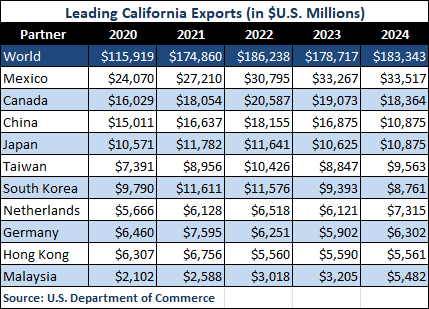 Canada has remained California’s second largest export market since 2006, with a total value of around $18.36 billion in 2024 (10.01% percent of all California exports). Top exports being computer and electronic products ($4.58 billion), agricultural products ($2.82 billion), transportation equipment ($2.06 billion), processed foods ($1.62 billion), and electrical equipment, appliances & components ($1.2 billion).
Canada has remained California’s second largest export market since 2006, with a total value of around $18.36 billion in 2024 (10.01% percent of all California exports). Top exports being computer and electronic products ($4.58 billion), agricultural products ($2.82 billion), transportation equipment ($2.06 billion), processed foods ($1.62 billion), and electrical equipment, appliances & components ($1.2 billion).
California imported a total of $16.27 billion from Canada in 2024. Top five imports were processed foods ($3.96 billion), oil and gas ($2.41 billion), chemicals ($1.12 billion), transportation equipment ($874 million), and computer & electronic products ($789 million). California currently holds a goods trade surplus with Canada of roughly $2.1 billion.
According to the Canadian government, two-way trade between California and Canada equals $53 billion annually; with 1,928 Canadian owned firms, employing 90,250 workers in California. (Connect2Canada)
According to Visit California, nearly 1.7 million people visited California from Canada in 2024, with spending at nearly $3.7 billion.
FDI – Canada
According to the most recent figures, the U.S. invested approximately $459.6 billion into Canada and foreign direct investment from Canada into the U.S. was just over $810 billion in 2024 (Bureau of Economic Analysis). Canada continues to be the second largest source of FDI in the U.S., with FDI from Canada directly supporting 887,900 jobs in the U.S. Canada invested $1.7 billion in research and development and contributed a value of $16.8 billion towards expanding U.S. exports. Canadian FDI is continuing to grow, as it is ranked the 11th fastest-growign source of FDI in the United States. The top U.S. industry sectors that Canada FDI goes to are software and IT services, business services, real estate, financial services, industrial equipment, and renewable energy (SelectUSA).
In 2024, Canada was the fourth largest source of FDI through foreign-owned enterprises (FOEs) in California. Canadian FOEs provided over 91,603 jobs through 2,016 firms amounting to $9.74 billion in wages. The top jobs by sector are professional and business services, retail trade, financial activities, manufacturing, and information (World Trade Center Los Angeles FDI Report).
More Articles:
A New Horizon of Opportunity: Canada in the Indo-Pacific
Commonwealth Club, March 30, 2023
Interview Series Featuring California’s Key Trading Partners – Featuring Rana Sarkar, Consul General of Canada in San Francisco:
Friendship with California More Important than Ever in Global Pandemic Fallout
CalChamber, August 7, 2020
California-Canadian Trade and Business Information
Trade Agreements and Issues
Canada and the U.S have a long-standing trade relationship, highlighted by their close proximity to each other geographically and their negations of their free trade agreement NAFTA, now the USMCA. Canada is a member of the UN, WTO, NATO, G7, G20, OECD, the OES, and more. It is also very active in humanitarian assistance around the world.
It holds 15 free trade agreements with 51 different countries such as, the U.S., China, Japan, the UK, Netherlands and Mexico. It has multiple agreements under negotiation, with one of the most notable being its trade agreement with the regional organization ASEAN, and South Korea.
While Canada is one of the richest economies in the world it does face issues such as inflation, lack of inventory of housing, and issues related to climate change. It has been able to curb many effects of inflation and according to the Canadian government as of February 2024, has reduced it to 2.8 percent from its peak of around 8 percent in June 2022.
For businesses it is important to research many of the regulations and inaccessibility of certain imports, according to the International Trade Administration. While Canada has similarities to the U.S in terms of its markets, it is important to research the sometimes small differences in regulations and access, as this could affect a firm’s ability to do business in Canada. For more information on some of these market challenges, please see the ITA’s market overview of Canada.
California and Canada- Renewable Energy
California has singed MOU’s and an MOC with Canada in regard to renewable energy, showing the close ties between the state and one of its largest trading partners not just economically, but in terms of other important global initiatives.
Climate Change Partnerships-California Energy Commission
Quebec Key Projects
The first one, the Cap & Trade, is being developed closely with California (the CARB). The objective is to link the systems together in a regional North American carbon market. For more information please refer to Program Design and Implementation | Our Work | WCI, Inc. (wci-inc.org), for direct links to contributors please see: California, Quebec, Washington.
The other project is called the «Plan Nord» (North Plan): « The Plan Nord is the project of a generation. It first offered a perspective of sustainable development in Québec and is now one of the biggest economic, social and environmental projects in our time. The Plan Nord will be carried out over a period of 25 years. It will lead to over $80 billion in investments during that time and create or consolidate, on average, 20 000 jobs a year, equivalent to 500 000 man-years. Northern Québec is fascinating because of its immense territory and the scale of its potential. Today, the context lends itself to its rediscovery.
For more information, please visit this www.PlanNord.com
MOU of the U.S.- Canada Regulatory Council
On Monday June 4, 2018, the council met to discuss regulatory cooperation between our countries and to sign a Memorandum of Understanding reaffirming the principles and commitments of the U.S.-Canada Regulatory Cooperation Council (RCC). Through the elimination of unnecessary regulatory differences, this MOU promotes economic growth, innovation, competitiveness, and job creation.
“As the President and Prime Minister reiterated last year, regulatory relations between the United States and Canada remain a priority with the Trump Administration. We have uniquely connected economies that together generate billions of dollars a day. An open dialogue on regulatory policy is necessary for our continued economic success,” said OMB Director Mick Mulvaney.
The MOU follows through on a commitment issued by President Trump and Prime Minister Trudeau in their joint statement on February 13, 2017, which said that our two countries “will continue our dialogue on regulatory issues and pursue shared regulatory outcomes that are business-friendly, reduce costs, and increase economic efficiency without compromising health, safety, and environmental standards.”
“This Memorandum of Understanding with our friends from Canada highlights the importance of regulatory cooperation. Reducing regulatory burdens promotes more effective, limited government, which contributes to economic growth and stimulates innovation. Identifying and eliminating unnecessary or duplicative regulations can help businesses and consumers on both sides of the border,” said OIRA Administrator Neomi Rao.
MOU – Canada-United States Regulatory Cooperation Council
Other Articles:
EnerTech Capital and Invest Alberta Corporation Sign International MOU with the California Mobility Center
California Mobility Center, April 27, 2022
Open Forum: Not Another Wall – Tariffs on Canada Will Harm California by Rana Sarkar, Consul General of Canada in SF
SF Gate, June 11, 2018
CETA- The Comprehensive Economic and Trade Agreement
The Comprehensive Economic and Trade Agreement is a trade agreement between the European Union and Canda which was signed in October of 2016, and enacted in September of 2017. The agreement will take full effect once all EU member countries have ratified which as of 2024, is still ongoing. This agreement gives the EU and Canada preferential access to their markets, and a majority of its economic parts are in force.
Joint report: Third CETA Joint Committee meeting
Government of Canada, December 2, 2022
EU-Canada Comprehensive Economic and Trade Agreement (CETA)
European Commission, 2017
Trans-Pacific Partnership Trade Agreement
CalChamber’s Information page on the TPP
USTR’s Information page on the TPP
USMCA / NAFTA
On November 30, 2018, President Donald J. Trump, Mexican President Enrique Peña Nieto, and Canadian Prime Minister Justin Trudeau signed the new United States-Mexico-Canada Agreement (USMCA). President Trump called the new USMCA the “most modern, up-to-date, and balanced trade agreement in the history of our country.”
At the signing, at the G20 meeting in Buenos Aires, Argentina, President Trump personally thanked outgoing Mexican President Peña Nieto, who then concluded the ceremony celebrating the close relationship between Mexico, Canada, and the United States, saying, “We’re ready to begin a new chapter in our shared history.”
In May 2019, the US and Canada reached an agreement to remove Section 232 tariffs and subsequent retaliatory measures, clearing the way for USMCA ratification in Canada.
The California Chamber of Commerce (CalChamber) and the Ontario Chamber of Commerce (OCC) encouraged California state leaders, and in particular the California Congressional Delegation and Ontario Premier Kathleen Wynne, in actively supporting the renewal of the North American Free Trade Agreement (NAFTA) during the renegotiation process.
The CalChamber actively supported the creation of the North America Free Trade Agreement (NAFTA) among the United States, Canada and Mexico, comprising 480 million people with combined annual U.S. trade in goods of over $1.1 trillion.
U.S., Mexico, Canada Sign New Trade Agreement
CalChamber, December 3, 2018
California Chamber of Commerce and Ontario Chamber of Commerce Join Forces in Support of NAFTA
CalChamber & Ontario Chamber, March 6, 2018
Additional References:
U.S. Trade Representative – USMCA
U.S. Dept. of Commerce International Trade Administration – USMCA
USMCA Full Text of the Agreement
United States-Mexico-Canada Agreement Website
Landmark U.S.-Mexico Canada-Agreement Brings Modernized Rules to Trade on July 1
CalChamber, June 29, 2020
Canada OK of U.S.-Mexico-Canada Pact Could Lead to June Implementation Date
CalChamber, March 20, 2020
Mexico Chief Negotiator Provides Insight on USMCA at CalChamber Lunch
CalChamber, January 30, 2020
President Trump Signs USMCA Trade Pact
CalChamber, January 29, 2020
USMCA Passes Senate, Awaits President Trump’s Signature
CalChamber, January 16, 2020
CalChamber Welcomes House of Representatives Vote to Approve USMCA
CalChamber, December 20, 2019
CalChamber Reiterates Support for U.S.-Mexico-Canada Agreement
CalChamber, May 14, 2019
Trade Mission
2007 Trade Mission
Canada Trip Touts Trade and Tourism

On May 29, 2007, California Chamber of Commerce President Allan Zaremberg, Governor Arnold Schwarzenegger, members of the press and a diverse business delegation departed today for a three-day trade mission to Canada to promote California products, services and tourist destinations.
“Canada is now the second largest customer for California’s exports, with a total dollar value of $14.2 billion in 2006. Two-way trade with Canada supports an estimated 832,000 jobs in California,” said Susanne Stirling, CalChamber vice president of international affairs. “With a population and economy larger than Canada, California is unquestionably a major market for Canadian manufactured goods, energy, forest and agri-food products and a wide range of services.”
Events
British-Columbia and CalChamber Talk During Uncertain Times

(February 13, 2025) – British Columbia’s Minister of Forest, Ravi Parmar was in Sacramento to discuss mutual issues regarding California and British Columbia’s interests around the proposed new tariffs, particularly on lumber. Appointed as British Columbia’s Minister of Forests in November 2024, Ravi Parmar also serves as Deputy Government House Leader. The Minister and CalChamber discussed strengthening the relationship between BC and California.
California, Canada Leaders Discuss Future of Energy Innovation at CalChamber Lunch
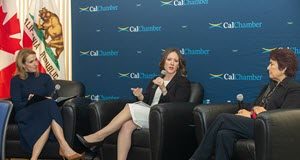
On January 14, 2025, the California Chamber of Commerce and the Consulate General of Canada in San Francisco hosted a talk on the ways Canada and California are shaping the future of carbon removal and hydrogen innovation.
The panel was moderated by CalChamber President and CEO Jennifer Barrera and featured Alberta Minister of Environment and Protected Areas Rebecca Schulz and California Senator Anna Caballero. Consul General Rana Sarkar provided introductory remarks at the start of the event.
In attendance were nearly 90 business and government leaders, including California Senator Roger Niello; California Assemblymembers Mike Fong and Gregg Hart; CalChamber Board Members Jennifer Haley, president and CEO of Kern Energy (see LinkedIn post,), and Christopher Holben, president of Runyon Saltzman, Inc.; Alberta Senior Representative to the U.S. James Rajotte; and Chief of Staff to the Alberta Minister of Environment and Protected Areas Christopher Thresher.
CalChamber-Hosted Luncheon Highlights Friendship, Connections with Canada
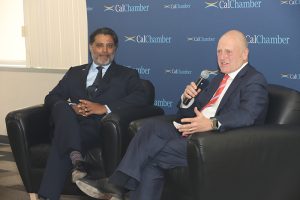
Canada’s close and longstanding partnership with the United States was the focus of a California Chamber of Commerce luncheon forum this week featuring Canada Consul General Rana Sarkar and former U.S. Ambassador to Canada Bruce Heyman.
The April 17 forum, Partnering for Prosperity, included opening and closing remarks by CalChamber President and CEO Jennifer Barrera, and brief comments by California Resources Agency Secretary Wade Crowfoot. In attendance were members of the California Legislature, and CalChamber Board member Margaret Wong, president and CEO of McWong International, Inc.
Alberta, Canada Representatives Visit the CalChamber

On Wednesday, August 9, 2023 representatives from the Government of Alberta, Canada and the Consulate General of Canada in San Francisco met with the CalChamber. Alberta is Canada’s fourth largest province by area and population, with an energy sector that is vital to the Canadian economy. The Government of Alberta recently has expanded its presence in the United States with four representative offices, including a West Coast Office. Topics of discussion included the California-Alberta relationship and the upcoming Asia-Pacific Economic Cooperation Summit in San Francisco.
Canada Day Lunch Focuses on Investors Helping Build Sustainable Economic Future
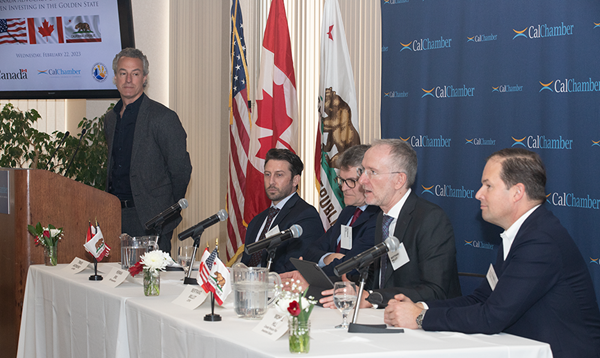 (February 28, 2023) Ways in which investments from Canada and California pension programs are advancing the move toward a green, sustainable economy were the focus of a recent luncheon discussion at the California Chamber of Commerce.
(February 28, 2023) Ways in which investments from Canada and California pension programs are advancing the move toward a green, sustainable economy were the focus of a recent luncheon discussion at the California Chamber of Commerce.
The February 22 gathering was presented by the Consulate General of Canada in San Francisco in partnership with the CalChamber and the Governor’s Office of Business and Economic Development.
Canadian Consul General Visits CalChamber
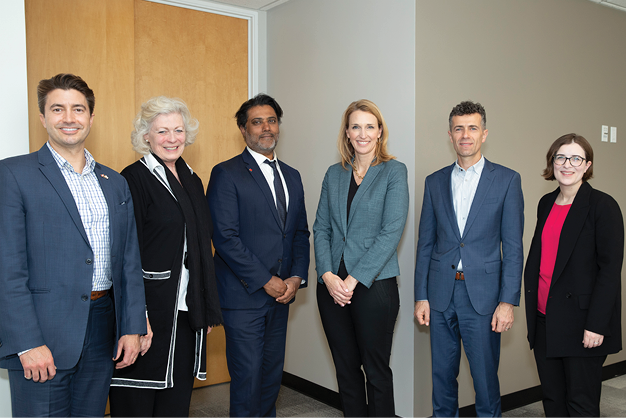
(March 14, 2022) Post-pandemic return-to-work policies, energy resources, climate change and trade issues were among the topics of discussion when a team from the Canadian Consulate General in San Francisco visited the California Chamber of Commerce on March 14.
Canadian Consul General Visits CalChamber; Discusses Privacy, Trade, Workforce Development

(February 26, 2020) Representatives of the Canadian Consulate General from San Francisco and Los Angeles visited the California Chamber of Commerce yesterday in celebration of Canada Day in Sacramento, affirming that the updated United States-Mexico-Canada Agreement (USMCA) underscores a renewed understanding among the countries on the importance of mutual trading relationships.
On Tuesday, Sarkar wrote a commentary on the Future of Work, highlighting the ways in which Canada is approaching workforce development to ensure Canadians are prepared to take on the jobs of the future. Canada’s approach, Sarkar said, includes three elements to upgrade the workforce for tomorrow: advance training, lifelong learning and modernized labor standards.
Canada Day: NAFTA 2.0 Creates Freer, Fairer Economic Growth
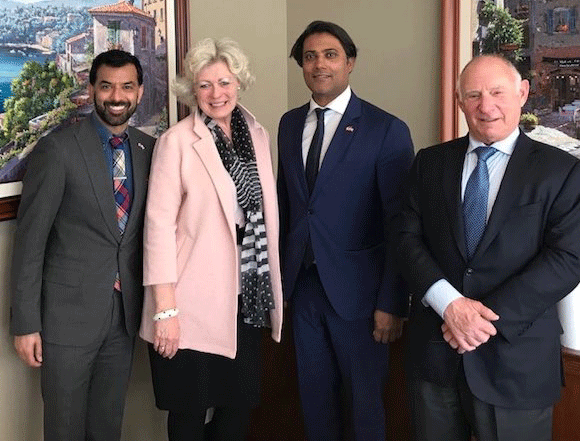
(February 21, 2019) The United States-Mexico-Canada Agreement (USMCA) underscores a renewed understating among the USMCA parties on the importance of our mutual trading relationships, everyone agreed yesterday at an international luncheon at the California Chamber of Commerce to celebrate Canada Day in Sacramento.
With the support of the Consulates General of Canada of San Francisco and Los Angeles and the Consulate General of Mexico in Sacramento, experts convened at the CalChamber for a thorough update and discussion on the agreement with more than 100 attendees.
Canada Day: What Changes in NAFTA Mean for Agriculture in California
On February 22, 2018 the California-Canada economic partnership, ongoing North American Free Trade Agreement (NAFTA) trade talks and what changes in the agreement could mean for agriculture in California were all discussed at a luncheon co-hosted by the California Chamber of Commerce.
With the support of the Consulates General of Canada of San Francisco and Los Angeles, and the California Farm Bureau Federation, experts convened at the Sutter Club in Sacramento for a thoughtful reflection and discussion. The discussion featured the Canadian Minister of Agriculture and Agri-Food, Lawrence MacAulay; California Secretary of Food and Agriculture, Karen Ross; as well as a panel discussion with Jamie Johansson, President of the California Farm Bureau Federation, and Jane Proctor, Vice President of Policy and Issue Management for the Canadian Produce Marketing Association. Top Story.
CalChamber Hosts Canadian Minister of Agriculture and Agri-Food
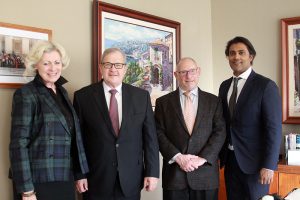
On February 21, 2018 the CalChamber hosted the Canadian Minister of Agriculture and Agri-Food, The Honorable Lawrence MacAulay. He was accompanied by a delegation from Canada, as well as the Canadian Consul General of San Francisco, Rana Sarkar.
Allan Zaremberg, CEO of the CalChamber, and Susanne Stirling, VP of International Affairs, reiterated their support for ongoing NAFTA negotiations and discussed the bilateral relationship between California and Canada’s agricultural industries.
The visit preceded the Consulate General of Canada’s annual Canada Advocacy Day events in Sacramento. Read more about the 2018 events here.
Canada Border Tour – September 2017

Susanne Stirling, CalChamber’s Vice President of International Affairs was was invited by the Canadian Consulate in San Francisco to participate in a tour of the Canadian border for three days to Vancouver and Prince Rupert, both in British Columbia. The group of about 15 from all around the U.S. together with about 15 Canadian officials, all sharing an interest in U.S.- Canada relations. Participants represented both the private and public sector from a number of states, and the federal government.
In her three-day trip blog, she outlines how it was an excellent opportunity to learn about border security, supply chain logistics, and free trade, and how she gained a deeper understanding of the different ports of entry into Canada (vehicle border check points, seaports, rail stations, airports) and how each functioned. This was a tour which was first established after 9/11 and has grown in size and scope.
2017 NAFTA Negotiations
On June 12, 2017 the California Chamber of Commerce submitted comments on “Negotiating Objectives Regarding Modernization of the North American Free Trade Agreement with Canada and Mexico” to the U.S. Trade Representative – with a copy to the California Congressional Delegation. The full text of the CalChamber’s submission can be found here.
CalChamber Partner in Governor’s Lunch for Mexico Secretary of Foreign Affairs
CalChamber, September 12, 2017 NAFTA Central to U.S. Global Economic Competitiveness, Security
NAFTA Central to U.S. Global Economic Competitiveness, Security
International Breakfast – CalChamber, Friday, September 8, 2017 with Michael C. Camuñez, Monarch Global Strategies.
Visit Reaffirms California-Canada Relationship
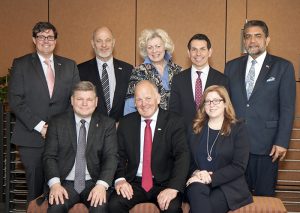
(April 4, 2017) The Standing Committee on International Trade of the Canadian House of Commons visited the California Chamber of Commerce on Tuesday, April 4, 2017 to reaffirm the importance of the long-standing and important California-Canada trade and investment relationship. The 12-member delegation representing different provinces and political parties met with Susanne Stirling, CalChamber vice president for international affairs.
Geographically, Canada is the second largest country in the world, with a population of 35.85 million and a gross domestic product (GDP) of $1.55 trillion (World Bank). The United States and Canada enjoy the largest bilateral trade and investment relationship in the world. In 2016, two–way trade in goods between Canada and the United States topped $544 billion, down from $575.2 billion in 2015. Exports to Canada were $265.9 billion, making it the largest export destination for the U.S. According to the most recent figures, U.S. companies invested approximately $353 billion into Canada and foreign direct investment from Canada into the U.S. was nearly $269 billion. Read More
North America Trade Policy: Opportunities Abound with California Neighbor
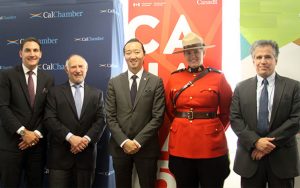
(March 8, 2017) While there are areas that can be improved, the North American Free Trade Agreement (NAFTA) serves the employment, trading and environmental interests of California, the United States, Canada and Mexico, and is beneficial to the business community and society as a whole, panelists concluded at a discussion co-hosted by the California Chamber of Commerce.
CalChamber President and CEO Allan Zaremberg served as moderator of the gathering with more than 100 luncheon attendees. Speakers included: Brandon A. Lee, consul general of Canada; Pedro Noyola, Ph.D., former undersecretary of trade and foreign investment and undersecretary of finance of Mexico, and representative of Mexico in various trade negotiations; and Andrew Grant, president and CEO, Northern California World Trade Center.
The objectives of the CalChamber-supported agreement are to eliminate barriers to trade, promote conditions of fair competition, increase investment opportunities, provide adequate protection of intellectual property rights, establish effective procedures for implementing and applying the agreements and resolving disputes, and to further trilateral, regional and multilateral cooperation. Top Story
Canada: Top U.S. Trade Partner Also No. 1 Market for California Services
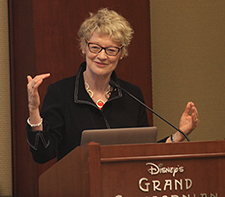
(September 5, 2014) A fact-filled look at the many connections between Canada, the United States and California was the focus of a recent breakfast gathering hosted by the California Chamber of Commerce Council for International Trade.
Consul General Cassie Doyle, Canada’s senior representative for Northern California, Nevada, Hawaii and Guam, emphasized that bilateral trade between Canada and the United States is the largest in the world, with more than $2 billion in goods and services crossing the border each day for a total of $735 billion in 2013.
CalChamber Hosts Canadian Roundtable
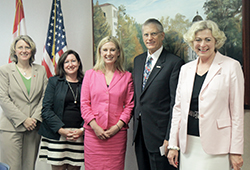
International Roundtable Offers Update on Canada Beyond the Border Action Plan
(August 1, 2013) Caron Wilson, policy adviser with Canada’s Privy Council Office, shared details on the Beyond the Border Action Plan between the United States and Canada during an International Roundtable at the California Chamber of Commerce yesterday.
The United States and Canada enjoy the largest bilateral trade and investment relationship in the world ($1.2 trillion). Canada-U.S. bilateral trade in goods and services surpassed $742.8 billion in 2012, with $2 billion worth of goods and services crossing the Canada-U.S. border daily. This is the equivalent of $1.4 million traded every minute.
On December 7, 2011, after consulting with stakeholders, chambers of commerce, industry and interest groups, President Obama and Prime Minster Harper released the Beyond the Border Action Plan, which seeks to deepen the Canadian partnership with the United States and enhance mutual security, prosperity and economic competitiveness while respecting each country’s sovereignty and privacy regimes.
CalChamber Hosts Consulates General of Canada in California for Canada Day
(March 13, 2013) The California Chamber of Commerce hosted Consulates General of Canada, Consul General Cassie Doyle of San Francisco and Consul General David Fransen of Los Angeles, on March 13, for the 7th annual celebration of Canada Day at the State Capitol.
In addition, an interactive business panel discussion held at the CalChamber office explored why Canada matters to California’s future prosperity and economic growth. The panel moderator was Toni E. Symonds, chief consultant to the California State Assembly Jobs, Economic Development and the Economy Committee. Panelists included: Erin McGillis, Achievers; Graham Ray, DeepRoot Green Infrastructure, LLC;, and Jonathan Allen, Avison Young.
Canadian Ambassador Gary Doer at Capitol for Canada Day
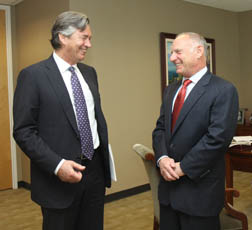 (March 12, 2012) Allan Zaremberg, CalChamber president and CEO, reiterates support to Canadian Ambassador Gary Doer for Canada’s interest in joining the Trans Pacific Partnership negotiations. Ambassador Doer was in Sacramento Monday, March 12 for “Canada Day.” He stopped by the CalChamber offices to speak with Zaremberg about the Trans Pacific Partnership, energy issues and the California-Canada trade relationship.
(March 12, 2012) Allan Zaremberg, CalChamber president and CEO, reiterates support to Canadian Ambassador Gary Doer for Canada’s interest in joining the Trans Pacific Partnership negotiations. Ambassador Doer was in Sacramento Monday, March 12 for “Canada Day.” He stopped by the CalChamber offices to speak with Zaremberg about the Trans Pacific Partnership, energy issues and the California-Canada trade relationship.
CalChamber Hosts Meeting to Catalyze Canada-California Collaboration
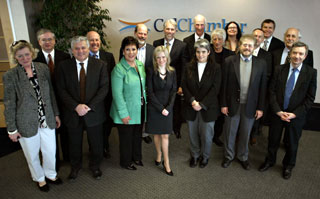
(March 13, 2009) The California Chamber of Commerce recently hosted a meeting of the Canada-California Strategic Innovation Partnership (CCSIP), a catalyst for collaborative research, development and delivery between two innovation-intensive jurisdictions: California, one of the most dynamic innovation engines on earth; and Canada, a leading country in university research intensity.
Pictured (left to right) Front Row: Susanne Stirling, Vice President, International Affairs, CalChamber; Henri Rothschild, President and CEO, ISTPCanada; Yolanda Benson, Government Strategies Inc.; Sonya Shorey, Communications Strategiest; Kathleen Erwin, Director, Research Program Application & Review Center; Lou Witkin, HP Labs Open Innovation Office; Thierry Weissenburger, Sr. Trade Commisioner, Canadian Consulate General.
Pictured (left to right) Back Row: Eric Holdrinet, Technology Officer, Canadian Consulate General; Barry Klein, Vice Chancellor, UC Davis; – John Hepburn, Vice President of Research, Univ. of British Colombia; Steven Beckwith, Vice President of Research, UC; Nigel Lloyd, Exec VP, Nat’l Sciences & Engineering Research Council of Canada; Denis Therien, VP of research & international relations, McGill Univeristy; Gretchen Kalonji, Director of Int’l Strategy, UC; Dominic Jean, Secretary, CCSIP; Marc LePage, Consul General, Canadian Consulate General, SF; Roberto Peccei, Vice Chancellor for Research, UCLA.
CalChamber Hosts Canadian Ambassador
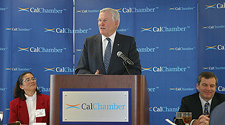
(December 13, 2007) The Honorable Michael Wilson, Canadian ambassador to the United States, highlights the prosperity California has gained through international trade with Canada at a December 13 International Luncheon Forum at the California Chamber of Commerce. Seated are Susan Corrales-Diaz, chair of the CalChamber Council for International Trade, and Marc LePage, consul general of Canada.
CalChamber Hosts New Canadian Consul General
 (September 18, 2009) Trade, health care, water and energy issues were among the topics of discussion when the CalChamber hosted a meeting with the new consul general of Canada. Pictured: Stewart Beck (left), Consul General of Canada, Allan Zaremberg (right), CalChamber President and CEO.
(September 18, 2009) Trade, health care, water and energy issues were among the topics of discussion when the CalChamber hosted a meeting with the new consul general of Canada. Pictured: Stewart Beck (left), Consul General of Canada, Allan Zaremberg (right), CalChamber President and CEO.
Opinion
Guest Commentary: Canada, California, and the Future of Work
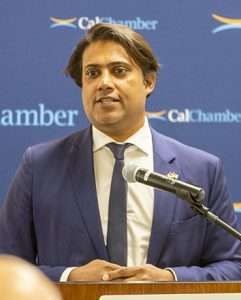
We are living in a time of economic upheaval and transformation, largely due to forces of globalization and the Fourth Industrial Revolution. Dynamics of this new industrial change–such as automation and artificial intelligence, and the rise of the “gig” economy–are dramatically altering how Californians, Canadians and citizens around the world live and work. Many technological developments originate in Silicon Valley, yet governments worldwide and at all levels must grapple with how these developments affect their citizens.
As Canada’s Consul General to Northern California, I am fortunate to be able to share Canada’s approach to the future of work at public forums throughout the state. Canada faces similar labor challenges to those in California: income inequality and ensuring that a rising tide does in fact lift all boats. To address these challenges, Canada has adopted a balanced approach to ensure that the Canadian labor force is prepared to take on the jobs of the future. Our approach includes three elements – advanced training, lifelong learning and modernized labor standards – to upgrade our workforce for tomorrow.
- Advanced training: Canada is implementing workforce development policies that ensure the next generation of workers is prepared for the future. Through its Future Skills Program, Canada is investing in advanced workforce training in automation, artificial intelligence, robotics, and clean tech. The Future Skills Program creates an expansive employment network to enhance access to in-demand training and skills. The program focuses on those not fully participating in Canada’s prosperity. The under and unemployed, women, youth, indigenous people, newcomers, racialized people, people with disabilities, veterans, and those from rural and remote communities can all benefit from this program.
- Lifelong learning: Through Canada’s Skills Boost, the government is providing support to adults who want to return to work and upgrade their skills. The Skills Boost program creates life-long learning accounts to ensure Canadian workers can have access to highly skilled, good paying jobs. It allows those recently laid off and returning to school to continue to collect unemployment and provides training grants for low- and middle-income adults with children. Adults who have been out of school for ten years or more also can qualify for post-secondary education grants.
- Modernized labor standards: Third, Canada is working to modernize labor standards in order to address workforce changes brought about by globalization, changes in technology, socio demographic shifts, and the explosion of the gig-economy. Through legislation and policy implementation, Canada is creating more flexibility around a worker’s schedule and benefits, providing greater labor protections for non-standard (i.e., gig-economy) workers, and allowing workers the fundamental “right to disconnect” from work-related communications outside of work.
Further, the thrust and values of these strategies are reflected across government from our approach to trade agreements, including the USMCA, to attracting and integrating new Canadians and economic policy making.
With these strategies, the Canadian government is taking steps that address the future of work for all of its citizens. As we collectively face the urgent challenges of the post-digital workforce, government at all levels, in close partnership with other sectors, need to take urgent, agile and often experimental action to ensure a successful transition into this new era. We are still in the early days of this effort. Openness, good will and trust and the ability to work inclusively across organizational and generational boundaries are key to success. We believe Canada is on the right path and hope to learn from our friends and allies in California, and around the world, as we do even more to support our future workers.
Rana Sarkar is Consul General of Canada, Northern California. This guest commentary was prepared in February 2020.
Related News
Key Country Contacts
Resources
CalChamber Resources
Business
Business
- California Governor’s Office of Business and Economic Development (GO-Biz)
- U.S. Commercial Service in Canada
- AmCham Canada
- Canadian Department of Foreign Affairs, Trade and Development
- Connect2Canada
- Invest in Canada
- Canadian Association of Importers and Exporters
- C-100
- British Columbia – Trade and Invest
- Invest in Ontario
- Quebec Government Office
- Surrey Board of Trade (Chamber of Commerce)
- Canada and the US – Business
- Canada-U.S. Regulatory Cooperation Council
